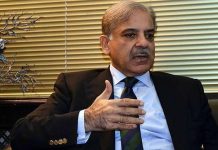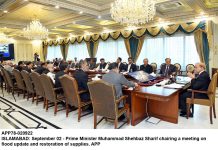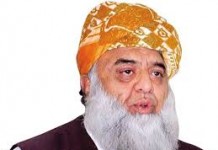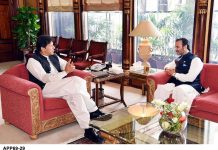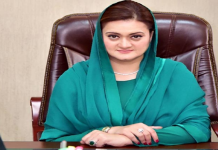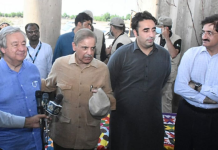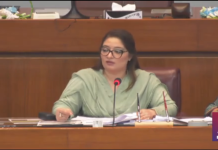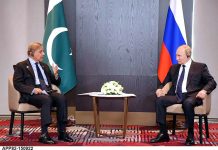
The ECP also decided to issue notices to the former prime minister and his son Ali Haider Gilani over a video in which the latter was seen telling PTI MNAs how to make a vote in the Senate election invalid and purportedly offered money and development funds.
The commission once again asked the PTI to also include as respondents the names of two of its lawmakers – Jamil Ahmed and Fahim Khan – who were allegedly involved in the video. However, the ECP rejected the plea to stop the issuance of the notification confirming Gilani’s victory in the recent elections for the Upper House. In a notification issued on Wednesday, the ECP notified the former prime minister as senator.
A four-member bench of the Election Commission, headed by its member from Punjab, Altaf Ibrahim Qureshi, heard the petition.
Advocate Amir Abbas, lawyer for PTI’s Alia Hamza, said that a video had been presented in the case regarding NA-75 Daska by-election, the forensic analysis of which has not been conducted. “The commission declared that people had been killed in Daska [but] nobody has been punished yet. Nothing was known about the killers till the ECP’s decision. If the candidate, election agent, or someone on behalf of them does corruption, the election becomes void. Corruption in elections includes bribery and influencing of voters,” he said.
The ECP member instructed the lawyer to talk about the facts of the case since the commission was aware of the law. The member from Khyber Pakhtunkhwa, Irshad Qaiser, observed that the case was a “question of the country’s future”. He assured the petitioners that whatever decision the ECP took on this “sensitive matter” would be done so independently.
However, Abbas argued that the video and evidence in the Daska case were “not looked at properly”. To this, ECP member Qureshi replied that the case was pending before the Supreme Court, telling Abbas not to stress on the Daska decision because it had been challenged.
Abbas questioned whether permission could be granted for corruption if the ballot papers were not identifiable. “If someone accepts [his corruption] before the entire media, it is considered as proof. Tribunals’ decisions do not take four years [then]. When the facts have been acknowledged, there is no need for forensics.”
Hamza then said that PTI’s Fauzia Arshad had received more votes than Finance Minister Hafeez Shaikh in the Senate elections to which ECP’s Qureshi replied that this was the beauty of democracy and secret voting. However, Abbas said that it was this “beauty of democracy due to which briefcases full of money were moved about”.
ECP’s Qureshi said it was unfortunate that the PTI itself was saying its members had been bought. He said the commission had watched the video and asked who was present in it. “There were no currency notes seen in Ali Haider Gilani’s video,” he added.
Qureshi said the decision to hold the polls through secret ballot was taken in view of the Supreme Court’s orders and if somebody had an issue with that, they could challenge it.
After Abbas, Barrister Ali Zafar started his arguments, informing the ECP that the PTI did not want to make the MNAs seen in the video respondents in the case.
He also told the ECP that PTI lawmakers Jamil Ahmed and Fahim Khan were in the video upon which the commission’s Punjab member questioned how it could be proved. The counsel then submitted affidavits from the two lawmakers, saying “both of them have accepted it in the affidavits.”
The ECP reminded Zafar it had directed that an amended petition be filed in which the two PTI lawmakers be made respondents. Zafar, however, said that the party did not want to make Ahmed and Khan respondents in the case and they had not accepted the offer in the video.
The ECP member from KP observed that the affidavit submitted by the lawmakers did not have the stamp from the oath commissioner. The counsel responded that the commission could hold an inquiry if it suspected the affidavits were false.
He also informed the ECP that the people who had made the video wanted to appear as witnesses in the case. To this, ECP’s Qureshi questioned whether those who took bribes were witnesses or suspects. Zafar replied that in the party’s eyes, parliamentarians in the video were not suspects. He further said that the PTI’s case was “proof of the offer of bribery”. However, it could not be termed a sting operation, he clarified.
ECP’s member from KP observed that the video was not “complete proof” as per the SC’s past judgements.
Moving on to the matter of stopping the issuance of notification, Qureshi said that the ECP had received a “lot of petitions” to stop notifications. “Should we stop notifications of all senators?” he asked.
Separately, the Islamabad High Court (IHC) on Wednesday dismissed a petition challenging the victory of Yousaf Raza Gilani in Senate polls and declared it as non-maintainable. IHC Chief Justice Athar Minallah said it was not appropriate to drag judiciary into the unnecessary political matters. He said petitioner Ali Nawaz Awan was a public representative and competent and he had yet several alternate forums to contest his case under election act. He should first approach there, he said.
Justice Minallah said how the court could accept this writ petition ignoring other legal forums. He said the petitioner was alleging for horse trading in the Senate polls but in the mentioned video two members of his party were also visible.
The court would proceed the case under the law, he said, adding the ECP is an independent institution. It was almost impossible to prove video in the court in quo warranto writ petition, he observed. He further said the ECP was an independent constitutional institution and only it was authorised to decide the matter.
The chief justice said the court had full confidence in the parliament and it always respected its members. Everyone was bound to follow the law, he added. The court observed that the petitioner’s political party Pakistan Tehreek-e-Insaf had already approached the ECP in that regard.
In a related development, the ECP on Wednesday fixed a hearing to discuss the Ali Haider Gilani video scandal on March 22, and issued notices to all the parties in the matter. Earlier, a four-member committee of the ECP had reserved its verdict after hearing arguments from the lawyer of Pakistan Tehreek-e-Insaf (PTI).

